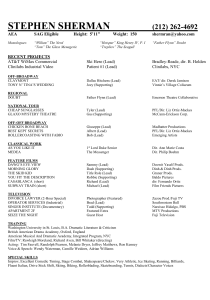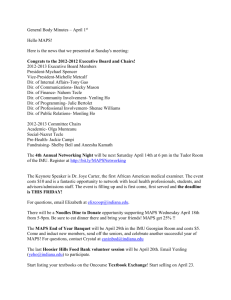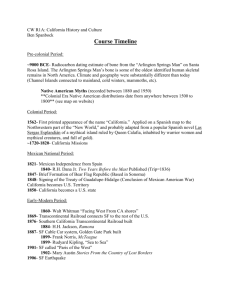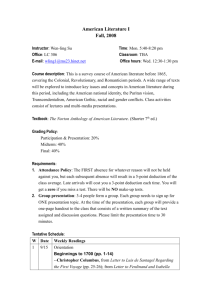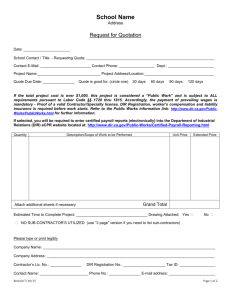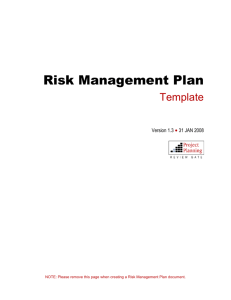Shakespeare ENG 220 Presentation Assignment (20 pts) Every
advertisement
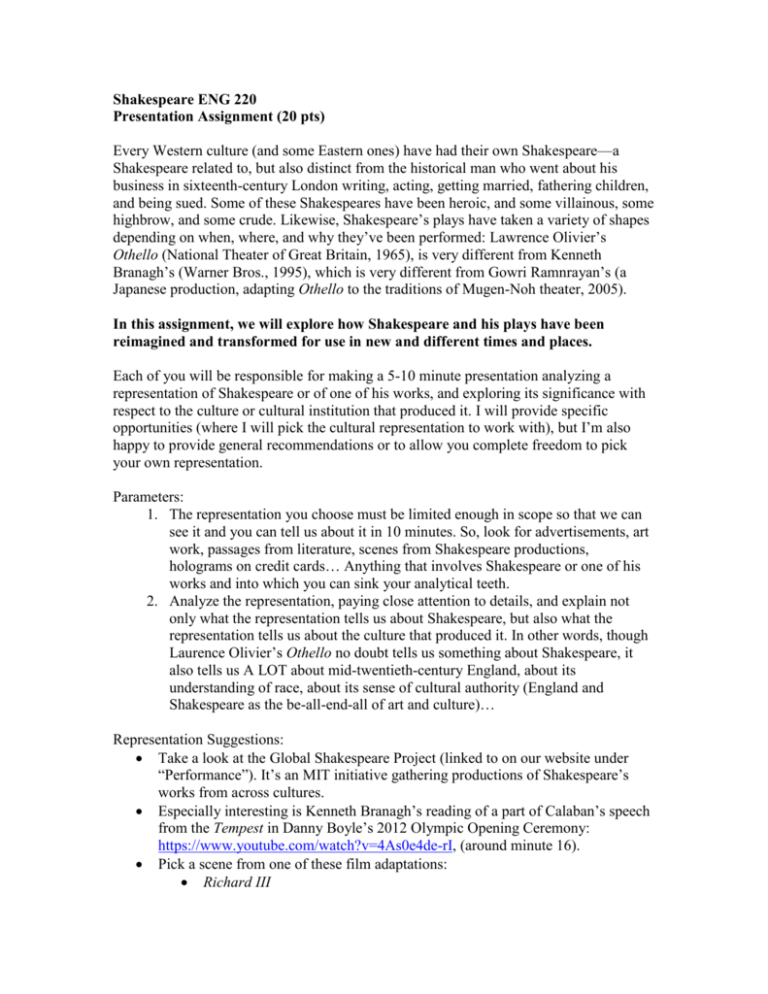
Shakespeare ENG 220 Presentation Assignment (20 pts) Every Western culture (and some Eastern ones) have had their own Shakespeare—a Shakespeare related to, but also distinct from the historical man who went about his business in sixteenth-century London writing, acting, getting married, fathering children, and being sued. Some of these Shakespeares have been heroic, and some villainous, some highbrow, and some crude. Likewise, Shakespeare’s plays have taken a variety of shapes depending on when, where, and why they’ve been performed: Lawrence Olivier’s Othello (National Theater of Great Britain, 1965), is very different from Kenneth Branagh’s (Warner Bros., 1995), which is very different from Gowri Ramnrayan’s (a Japanese production, adapting Othello to the traditions of Mugen-Noh theater, 2005). In this assignment, we will explore how Shakespeare and his plays have been reimagined and transformed for use in new and different times and places. Each of you will be responsible for making a 5-10 minute presentation analyzing a representation of Shakespeare or of one of his works, and exploring its significance with respect to the culture or cultural institution that produced it. I will provide specific opportunities (where I will pick the cultural representation to work with), but I’m also happy to provide general recommendations or to allow you complete freedom to pick your own representation. Parameters: 1. The representation you choose must be limited enough in scope so that we can see it and you can tell us about it in 10 minutes. So, look for advertisements, art work, passages from literature, scenes from Shakespeare productions, holograms on credit cards… Anything that involves Shakespeare or one of his works and into which you can sink your analytical teeth. 2. Analyze the representation, paying close attention to details, and explain not only what the representation tells us about Shakespeare, but also what the representation tells us about the culture that produced it. In other words, though Laurence Olivier’s Othello no doubt tells us something about Shakespeare, it also tells us A LOT about mid-twentieth-century England, about its understanding of race, about its sense of cultural authority (England and Shakespeare as the be-all-end-all of art and culture)… Representation Suggestions: Take a look at the Global Shakespeare Project (linked to on our website under “Performance”). It’s an MIT initiative gathering productions of Shakespeare’s works from across cultures. Especially interesting is Kenneth Branagh’s reading of a part of Calaban’s speech from the Tempest in Danny Boyle’s 2012 Olympic Opening Ceremony: https://www.youtube.com/watch?v=4As0e4de-rI, (around minute 16). Pick a scene from one of these film adaptations: Richard III Richard III (Robert Gemp, Frederick Warde), dir. Andre Calmettes and James Keane, 1912. Richard III (Laurence Olivier, John Gielgud), dir. Laurence Olivier, 1955. Richard III (Ian McKellen, Robert Downey Jr.), dir. Richard Loncraine, 1995. Looking for Richard (Al Pacino, Kevin Spacey), dir. Al Pacino, 1996. Midsummer Night’s Dream Midsummer Night’s Dream (Mickey Rooney, James Cagney), dir. Max Reinhardt and William Dieterle, 1935. Midsummer Night’s Dream (Diana Rigg, Helen Mirren), dir. Peter Hall, 1968. Midsummer Night’s Dream (Michelle Pfeiffer, Calista Flockhart), dir. Michael Hoffman, 1999. Richard II Richard II (Derek Jacobi, John Gielgud), dir. David Giles, 1978. King Richard II (David Birney, Paul Shenar), dir. William Woodman, 1982. Henry IV, Part I Chimes at Midnight (Falstaff) (Orson Wells, John Gielgud), dir. Orson Wells, 1965. My Own Private Idaho (River Phoenix, Keanu Reeves), dir. Gus Van Sant, 1992. Hamlet Hamlet (Astra Nielson, Mathilde Brandt), dir. Sven Gade and Heinz Schall, 1921. Hamlet (Laurence Olivier, Basil Sydney), dir. Laurence Olivier, 1948. Hamlet (Richard Burton, John Gielgud), dir. John Gielgud and Bill Colleran, 1964. Hamlet (Mel Gibson, Glen Close), dir. Franco Zeffirelli, 1990. Hamlet (Kenneth Branagh, Kate Winslet), dir. Kenneth Branagh, 1996. Hamlet (Ethan Hawke, Bill Murray), dir. Michael Almereyda, 2000. Othello The Tragedy of Othello: The Moor of Venice (Orson Welles, Suzanne Cloutier), dir. Orson Welles, 1952. Othello (Laurence Olivier, Maggie Smith), dir. Stuart Burge, 1965. Otello (Placido Domingo, Katia Ricciarelli) dir. Franco Zefirelli, 1986. Othello (Laurence Fishburne, Kenneth Branagh), dir. Oliver Parker, 1995. O (Mekhi Phifer, Julia Stiles), dir. Tim Blake Nelson, 2001. The Tempest Forbidden Planet (Leslie Nielsen, Walter Pidgeon), dir. Fred M. Wilcox 1956. The Tempest (Heathcote Williams, Peter Bull), dir. Derek Jarman, 1979. Tempest, (Susan Sarandon, John Cassavetes), dir. Paul Mazursky, 1982. Prospero’s Books (John Gielgud, Michael Clark), dir. Peter Greenway, 1991. Tempest (Helen Mirren, Felicity Jones), dir. Julie Taymor, 2010.
